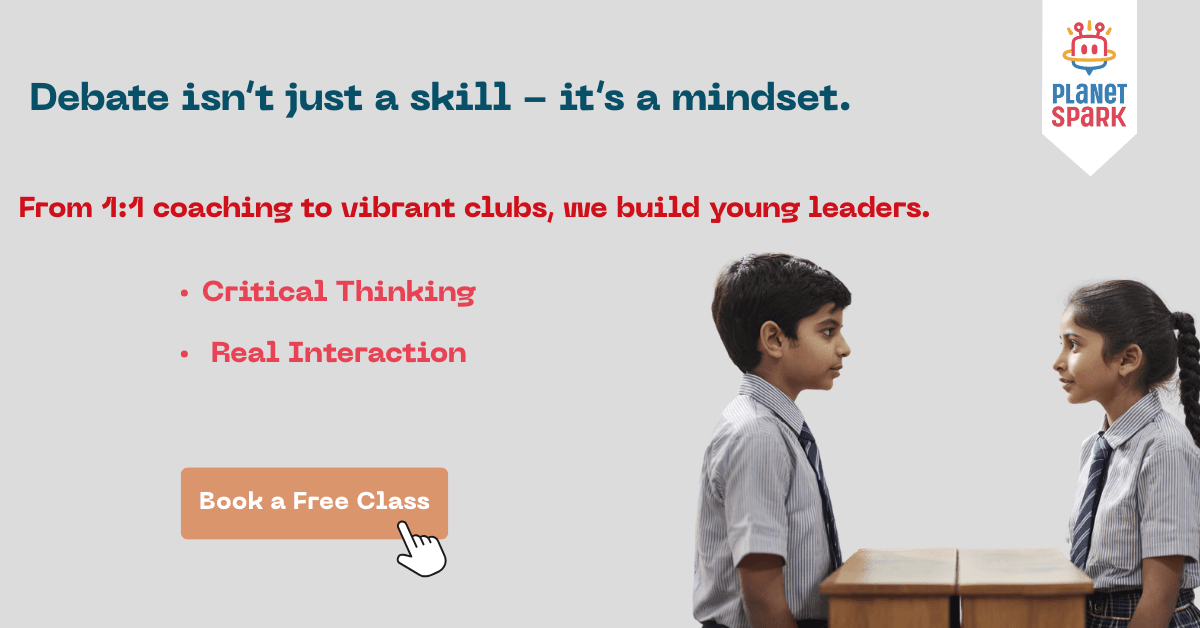How to Give Rebuttals in Debate | PlanetSpark Guide
Last Updated At: 14 Jul 2025
8 min read

Table of Contents
- What are Rebuttals in Debates?
- Why Are Rebuttals Important in Debates?
- The Basic Structure of a Rebuttal
- Key Elements to Include in a Rebuttal
- Rebuttals in Academic Writing
- Tips for Writing a Good Academic Rebuttal Letter
- Sample Format for a Debate Rebuttal
- Ready-to-Use Rebuttals for Kids’ Debates
- How PlanetSpark Helps Children Master Rebuttals and Debate
- Final Thoughts
- Frequently Asked Questions
What are Rebuttals in Debates?
Rebuttals in debates are counterarguments used to directly refute an opponent's points. Debaters use rebuttals to weaken opposing claims by exposing logical flaws, inaccuracies, or contradictions. Effective rebuttals strengthen a team's position by undermining the credibility or logic of the opposing case.
Why Are Rebuttals Important in Debates?
Rebuttals are the most dynamic part of any debate. They show that the speaker is not only prepared with their own points but is also actively listening, processing, and responding to what others are saying. This ability demonstrates both presence of mind and depth of understanding.
Rebuttals also encourage respectful disagreement. Instead of shouting or dismissing someone’s opinion, a rebuttal allows a child to express disagreement logically and politely. This helps develop emotional intelligence, critical thinking, and leadership skills, all of which are core components of our communication skills curriculum at PlanetSpark.

The Basic Structure of a Rebuttal
Rebuttals may feel difficult at first, but once you understand the structure, they become much easier. Here’s a commonly used format that even beginners can follow:
Restate the Opponent’s Argument Briefly: This shows that you understood the argument before challenging it.
State Your Counter-Claim: This is your opportunity to present an alternative viewpoint.
Provide Supporting Evidence: Use facts, examples, or data to show why your counter-claim is stronger.
Conclude with Impact: Tie it back to your main argument or highlight the flaw in the opponent's logic.
This structure helps students stay organised, calm, and impactful while responding to tough questions during a debate.
Key Elements to Include in a Rebuttal
A strong rebuttal is made up of specific components that elevate it beyond simple contradiction. Here’s what to focus on:
1. Understanding the Opponent’s Argument
Never misrepresent the other side. Your rebuttal loses credibility if you twist their words. Teach your child to always listen carefully and summarise their opponent’s point with fairness.
2. Direct Quotations (if required)
Quoting your opponent directly, especially in formal debates, can help preserve accuracy. It also adds credibility to your response and proves you’ve paid attention.
3. Rational Evidence
Avoid emotional appeals. A powerful rebuttal is supported by statistics, historical examples, expert opinions, or logical reasoning. Help your child understand how to find and use reliable sources.
4. Respectful Tone
Even in disagreement, kindness matters. Personal attacks weaken your argument. Teach kids to be assertive but polite. The goal is to win the argument, not to insult the speaker.
PlanetSpark classes include live debates, mock rebuttal rounds, and expert mentor feedback helping kids practice all these elements naturally.
Join us today and start their communication journey the right way.
Rebuttals in Academic Writing
Rebuttals are not limited to verbal debates. Students also encounter them in written forms, especially in academic writing or when responding to feedback. Knowing how to write an academic rebuttal is a valuable life skill.
In academic rebuttal letters, the tone needs to be professional and calm. Students should thank reviewers for their feedback, address each point with evidence, and explain changes made. This develops patience, attention to detail, and clarity of communication.
Tips for Writing a Good Academic Rebuttal Letter
If your child is writing a rebuttal letter for an academic assignment or competition, here are a few practical tips:
Be respectful even when disagreeing
Address every point one by one
Highlight specific changes made
Add a positive closing remark
Review the tone for clarity and politeness
These practices help children learn how to defend their ideas without being aggressive. It also prepares them for future interactions in professional and educational settings.

Sample Format for a Debate Rebuttal
Here’s a simple format that kids can memorise and apply during live debates:
“The opposition argues that [insert summary]. However, this argument overlooks the fact that [insert key point]. Based on [insert evidence], it is clear that [conclusion].”
This can be practised with friends, in class, or during online debate sessions. The more your child rehearses rebuttals, the more naturally they’ll perform during actual competitions.
Ready-to-Use Rebuttals for Kids’ Debates
Topic: Should homework be banned?
Opponent's Point: Homework adds pressure on students.
Rebuttal: While it's true that excessive homework can be stressful, studies show that moderate homework improves time management and reinforces learning.
Topic: Are video games harmful?
Opponent's Point: Video games lead to addiction.
Rebuttal: That may happen in extreme cases, but most children play games in moderation. In fact, many games improve decision-making and reflexes.
Topic: Is online learning better than offline?
Opponent's Point: Online learning is isolating.
Rebuttal: While it may feel isolated at times, online learning offers flexibility, global access to teachers, and tech-based interactivity.
Topic: Should school uniforms be compulsory?
Opponent's Point: Uniforms kill individuality.
Rebuttal: Uniforms actually promote equality by removing visible economic differences, helping students focus more on learning.
Topic: Should junk food be banned in schools?
Opponent's Point: Kids should have the freedom to choose what they eat.
Rebuttal: Freedom is important, but schools also have a responsibility to encourage healthy habits. Banning junk food supports long-term well-being.
Topic: Are exams necessary?
Opponent's Point: Exams cause anxiety and fear.
Rebuttal: Anxiety comes from pressure, not exams themselves. When done right, exams help assess understanding and prepare students for future challenges.
Topic: Should mobile phones be allowed in school?
Opponent's Point: Phones help students access information.
Rebuttal: That’s true, but phones also distract from learning. Schools already provide resources like libraries and supervised internet use.
Topic: Is social media good for children?
Opponent's Point: Social media helps kids stay connected.
Rebuttal: While it connects people, overuse can reduce face-to-face interactions and lead to self-esteem issues, especially in children.
Topic: Should school start later in the day?
Opponent's Point: Starting school late disrupts parents’ schedules.
Rebuttal: That’s a concern, but research shows that later start times improve student focus, mood, and academic performance.
How PlanetSpark Helps Children Master Rebuttals and Debate
At PlanetSpark, we understand that giving rebuttals is not a skill that develops overnight. That’s why we have built a structured curriculum that introduces rebuttals in a step-by-step manner.
Our Public Speaking and Debate programs include:
Live 1:1 classes with expert communication coaches
Mock debates with timed rebuttal rounds
Real-world examples and formats
Confidence-building speech drills
Regular assessments and personalised feedback
Tools like SparkX and Spark Diary for ongoing practice
We don’t just teach students what to say. We help them understand how to say it and why it matters. Every child learns at their own pace in a safe, supportive environment.
Final Thoughts
Learning to give rebuttals is more than a debate skill, it’s a communication superpower. It teaches children to listen carefully, think critically, and respond thoughtfully. Whether it's in a classroom, a future boardroom, or even a family discussion, the ability to counter arguments with grace and logic will always be a valuable asset.
If you're looking for a trusted way to help your child develop strong rebuttal skills, join PlanetSpark’s Public Speaking and Debate programs. Our expert mentors, engaging formats, and real-world applications will set your child up for lasting success.
Frequently Asked Questions
1. What is the right age to start debate for kids?
Children as young as 7 or 8 years old (Grade 2 onwards) can start learning the basics of debate. At this age, they can understand structure, form opinions, and learn how to express them respectfully.
2. Why should my child learn debate skills?
Debate helps kids build confidence, improve public speaking, develop critical thinking, and learn to present logical arguments. It also strengthens listening skills and empathy.
3. How is debate different from regular public speaking?
While public speaking focuses on expressing ideas clearly, debate adds the layer of rebuttal, counterarguments, and logic-based disagreement. It teaches children to think on their feet and respond respectfully.
4. Is debate too competitive or stressful for young children?
Not at all. When taught properly, debate is fun, interactive, and empowering. At PlanetSpark, our debate programs are age-appropriate and focus on growth rather than just winning.
5. What topics are used in kids’ debate sessions?
Topics are carefully selected to be age-relevant and engaging, such as "Should homework be banned?" or "Are video games good for learning?" These help kids learn without pressure.
6. Can shy or introverted kids participate in debate?
Yes. In fact, debate is a great way to help shy kids come out of their shell. Our 1:1 sessions allow them to build skills gradually in a safe and supportive environment.
7. How are PlanetSpark debate classes structured?
PlanetSpark offers live 1:1 online classes where trained mentors guide students through the basics of debate, structure, rebuttals, mock debates, and performance tracking. Progress reports and parental feedback are part of the process.
8. Do PlanetSpark debate classes help with school competitions?
Absolutely. Many of our students have won school-level and national competitions after going through our debate programs. We also offer special practice modules before events.
9. What if my child has never debated before?
No prior experience is needed. Our beginner modules start from the ground up and focus on building confidence before diving into advanced techniques like rebuttals and timed responses.
10. How can I enroll my child in PlanetSpark’s debate program?
You can book a free demo class directly through our website. After the trial, our team will help you select the right learning path based on your child’s level and goals.
Personalized Communication Report
Record a video to get a AI generated personalized communication report for your child
Select Learner's Class

Hi There, want to try these
tips for your child with
LIVE with our expert coach?
Let's check your child's
English fluency
